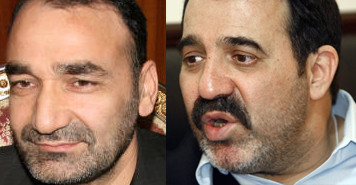By Trudy Rubin
My Thursday column was about the most powerful man in Kandahar, President Hamid Karzai’s brother Ahmed Wali Karzai.
I promised to write more of my interview with AWK, as he’s called, because this one powerbroker personifies so many of the contradictions that are bedeviling U.S. and NATO forces in Aghanistan.

Philly.com, May 22, 2011: It may well be, after all, that AWK, a Pashtun, is no more corrupt than a host of other warlords in the country, including ethnic Hazaras and Tajiks, like the governor of Balkh province, who has a notorious rep for corruption. Yet Sen. John Kerry, in Afghanistan last week, made a special visit to Atta, whose authoritarian rule does allow international aid agencies to proceed with development projects. I don’t know why Kerry was courting Atta, but Pashtuns ask: why criticize AWK for corruption if Kerry rushes to visit Atta? Why indeed? (Photos: http://afghanpenlog-en.blogspot.com/2010_01_01_archive.html & Rahmat Gul/Associated Press)
The American relationship with AWK demonstrates why the United States has so much trouble confronting the Afghan corruption that feeds Taliban recruitment. Too often U.S. officials depend on problematic characters like Karzai to help them provide security or deal with tribal issues, so they look the other way at behavior that otherwise might lead to indictments.
Two years ago U.S. officials in Kabul believed Karzai was linked to the drug trade. Now they say that, while he has friends who are druglords, they have no proof he was complicit. Back then, U.S. officials said Karzai, who is the head of the Kandahar provincial council, was packing district offices with members of his Popalzai tribe, alienating other tribal groups in ways that pushed them towards the Taliban.
Now U.S. officials here say that Karzai now understands the need to hand out posts to non-Popalzai candidates, and that his help is essential in balancing Kandahar tribes. AWK rattled off name after name of district officials he had backed who were not from his tribe.
When I asked Karzai about charges by local Kandaharis that he handpicked weak candidates for Kandahar provincial governor and mayor, and that his picks for police officials encouraged corruption, he was alternatively bored and cocky.
A Kandahar jailbreak in which 500 prisoners, including many Taliban, escape: “absolutely not a failure of governance.” The fact that his brother-in-law Mirwais Nurzai remains deputy chief of police in the Kandahar area despite the jailbreak, and the assassination of key police officials, and the fact that he’s related by marriage to a known drug baron, is normal: “this is not his responsibility.” The fact that Taliban were able to carry out a coordinated mass attack on Kandahar two weeks ago was “absolutely not a failure of governance.”
And his brother Mahmoud’s involvement in a huge, shady land deal whereby the mayor (chosen by AWK) sold government land dirt cheap to a consortium that then built a vast estate of mega mansions “is the only good thing that has happened to this district since 2002. That’s capitalism.”
“I don’t deny corruption. I don’t support corruption,” says AWK, secure in the knowledge that the Americans need him. “You came to fight a war against terrorism. You are not here to fix (corruption) or leave because of it. Corruption happens everywhere.”
It may well be, after all, that AWK, a Pashtun, is no more corrupt than a host of other warlords in the country, including ethnic Hazaras and Tajiks, like the governor of Balkh province, who has a notorious rep for corruption. Yet Sen. John Kerry, in Afghanistan last week, made a special visit to Atta, whose authoritarian rule does allow international aid agencies to proceed with development projects. I don’t know why Kerry was courting Atta, but Pashtuns ask: why criticize AWK for corruption if Kerry rushes to visit Atta? Why indeed?



